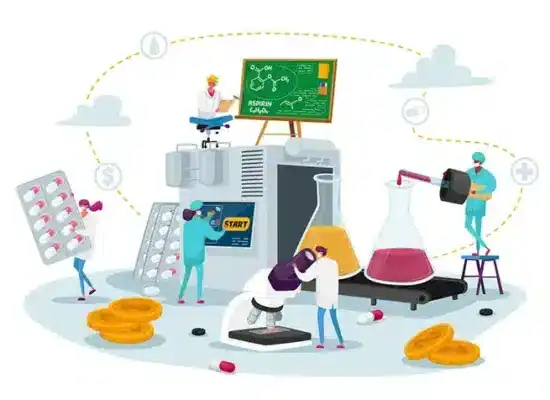What Can You Do with a Health Science Degree?
Updated: November 24, 2025

When choosing a college degree, you probably want something that opens doors—not just academically, but professionally too. Health science is one of those degrees that can lead to a wide range of careers, whether you’re interested in working directly with patients, conducting research, or helping shape healthcare policy.
So what can you actually do with a health science degree? In this article, we’ll walk you through the types of degrees available, the careers you can pursue at each level, and why health science is a strong option for anyone looking to make an impact in the healthcare field.

What Is Health Science?
Health science is the study of how science and human behavior come together to improve health and well-being. It brings together disciplines like biology, chemistry, psychology, and sociology—and applies them in real-world healthcare settings.
As a health science student, you’ll also explore topics like health policy, healthcare systems, and the business side of medicine. It’s a broad and flexible field that prepares you for many different roles, from direct patient care to administrative leadership.
Types of Health Science Degrees
Whether you’re just getting started or thinking about advancing your career, there’s a health science degree that can fit your goals. Here’s a breakdown of the main degree levels and what you can expect from each.
Associate of Science in Health Science (AHS)
An associate degree in health science is a great entry point into the healthcare field. It usually takes about two years and gives you the foundation to work in roles like medical assistant, pharmacy technician, or healthcare support staff.
You’ll study topics like mental health, basic medical terminology, and how to interpret health data. After graduation, you can either start working right away or use your credits to continue toward a bachelor’s degree.
Bachelor of Science in Health Science (BHS)
A bachelor’s degree in health science goes deeper into areas like health management, human anatomy, and public health systems. It typically takes four years to complete, though you can take it part-time or full-time depending on your schedule.
You’ll usually choose between a Bachelor of Science (BS) or a Bachelor of Arts (BA). A BS tends to include more science and clinical courses, which is ideal if you want to pursue a hands-on role in healthcare or prepare for grad school.
At University of the People, you can earn your bachelor’s degree in health science 100% online and tuition-free—making it a flexible option if you’re balancing work or family commitments.
Master of Health Science (MHS)
A master’s degree in health science lets you specialize and build expertise in areas like sports medicine, nutrition, risk management, or healthcare law. It’s a good choice if you’re aiming for leadership roles, want to deepen your clinical knowledge, or are thinking about teaching in the field.
Most programs take 1–2 years, and many are available online for working professionals.
Doctor of Health Science (DHS)
This is the highest degree you can earn in the field. A doctorate prepares you for senior-level careers in research, education, public health, or policy-making.
With this degree, you could work as a health scientist, researcher, university professor, or health informatics specialist. It’s a long-term investment, but one that can position you as a leader in the healthcare industry.
Best Jobs with a Health Science Degree
Once you’ve earned your health science degree, you’ll find a wide range of job opportunities—depending on your level of education and interests. Here are some of the top career paths to consider:
Occupational Therapist
As an occupational therapist, you’ll work closely with people recovering from injuries, surgeries, disabilities, or long-term health conditions. Your job is to help them regain independence in daily life—whether that means learning to use adaptive equipment, rebuilding motor skills, or adjusting to changes in mobility.
This is a hands-on, patient-centered role that blends healthcare with creativity and compassion.
- Required Degree: Master’s
- Median Annual Salary: $96,370
Medical Assistant
Medical assistants play a critical role in keeping healthcare offices running smoothly. In this role, you’ll handle both administrative tasks (like scheduling appointments and managing patient records) and basic clinical duties (like taking vital signs or assisting with exams).
It’s a great entry point into healthcare and offers lots of room for growth with experience or further education.
- Required Degree: Associate’s or Certificate
- Median Annual Salary: $42,000
Clinical Research Scientist
Clinical research scientists design and run studies to test new treatments, drugs, or medical devices. You’ll be involved in managing clinical trials, analyzing data, and ensuring that all research complies with strict safety and ethics standards.
This role is ideal if you enjoy working at the intersection of science, data, and patient care, and it can also open doors to leadership or pharmaceutical careers.
- Required Degree: Bachelor’s (often with additional certifications or advanced degrees)
- Average Annual Salary: $134,336
Respiratory Therapist
As a respiratory therapist, you’ll help patients who have difficulty breathing—often due to conditions like asthma, COPD, or infections. You might work with patients in intensive care units, emergency rooms, or outpatient clinics, providing treatments and using specialized equipment like ventilators.
It’s a rewarding career with strong job growth, especially for those interested in acute care.
- Required Degree: Associate’s
- Median Annual Salary: $77,960
Surgical Technician
Surgical technicians are part of the operating room team, supporting surgeons before, during, and after procedures. You’ll prepare instruments, maintain sterile environments, and help ensure everything runs efficiently during surgery.
It’s a fast-paced role that requires strong attention to detail and a cool head under pressure, making it ideal for those who want to work behind the scenes in a clinical setting.
- Required Degree: Certificate or Associate’s
- Median Annual Salary: $60,370
Health Educator
If you’re passionate about wellness and public health, becoming a health educator could be the perfect fit. You’ll develop programs that teach people how to make healthier lifestyle choices, manage chronic conditions, or access medical services.
Health educators often work in schools, nonprofit organizations, or government agencies, helping entire communities improve their long-term well-being.
- Required Degree: Bachelor’s
- Median Annual Salary: $62,860

Is a Health Science Degree Right for You?
If you’re considering a career in healthcare but don’t necessarily want to become a doctor or nurse, a health science degree could be a great fit. It’s ideal for people who enjoy science, want to make a difference in others’ lives, and are open to a variety of career paths—from hands-on clinical work to research, education, or healthcare administration.
This degree also gives you flexibility. Whether you’re starting fresh, changing careers, or planning to specialize later on, a background in health science builds the foundation you need. It’s especially useful if you want to work in healthcare but aren’t yet sure which role is right for you.
If you like the idea of helping people, working in a fast-growing industry, and building skills that are always in demand, health science is worth serious consideration.Final Thoughts
Now that you’ve explored the various career paths available with a health science degree, it’s clear that this field offers a wealth of opportunities. Whether you’re interested in direct patient care, research, education, or administrative roles, a degree in health science can serve as a solid foundation for your career.
If you’re ready to take the next step, consider enrolling in the University of the People’s Health Science program. With flexible, tuition-free online options, it’s designed to help you achieve your goals without the financial burden
FAQs
Is a health science degree worth it?
Yes. A health science degree opens doors to growing careers in healthcare, research, education, and administration.
What jobs can I get with a bachelor’s in health science?
You can work as a health educator, clinical researcher, or apply to graduate programs in public health, occupational therapy, or healthcare admin.
Can I work in a hospital with a health science degree?
Absolutely. Many roles—like medical assistants, respiratory therapists, or surgical techs—work in hospital settings.
What’s the highest-paying job in health science?
Clinical research scientists and occupational therapists tend to have some of the highest average salaries in this field.
Can I study health science online?
Yes! University of the People offers 100% online, tuition-free degree programs in health science at the associate and bachelor’s level.
